MMA
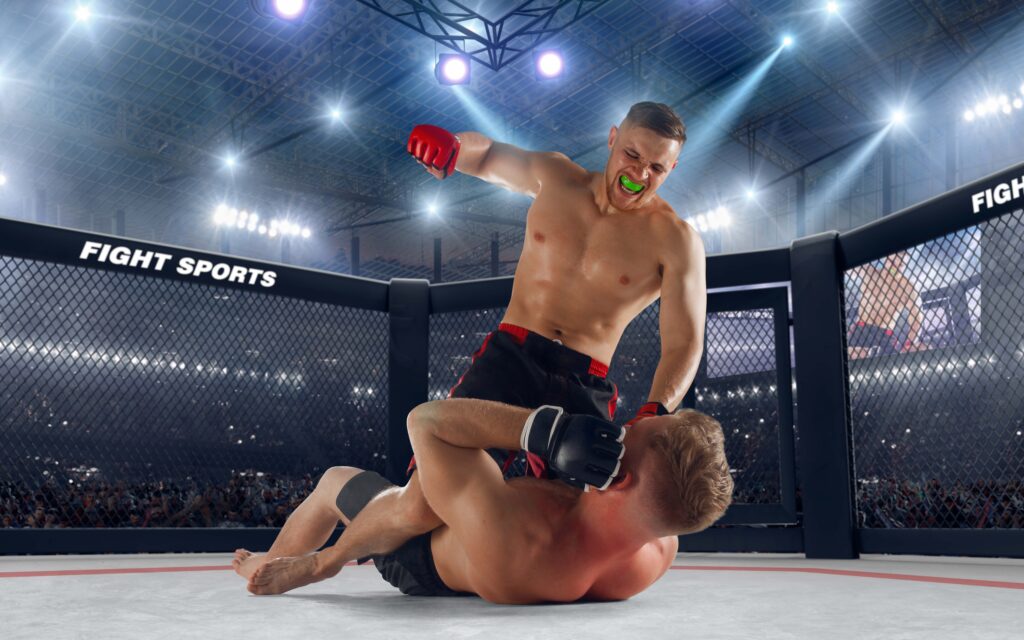
Is Intelligence the New Secret Weapon in MMA?
In the octagon, brute strength and cardiovascular endurance have always been revered. But are we witnessing the dawn of a new era where tactical intelligence and mental adaptability are as crucial as a devastating blow?
Increasingly, we see fighters who are not only exceptional athletes but also astute strategists. They analyze their opponents with surgical precision, identify weaknesses, and exploit patterns. It’s no longer enough to be strong; you have to be smart.
Think of figures like Israel Adesanya, whose ability to read his opponents and anticipate their movements is as impressive as his striking. Or Charles Oliveira, who has demonstrated amazing mental resilience, overcoming adversity and adjusting his strategy in real time.
Are we entering an era where the «intellectual warrior» will dominate the sport? Will we see more fighters investing in mental training and strategic analysis, rather than just grinding in the gym? The answer, as always in MMA, is uncertain, but one thing is clear: intelligence is gaining ground in the octagon, and fighters who ignore it do so at their own peril.

The Impact of MMA on Society and Pop Culture
MMA is no longer a fringe sport relegated to a niche of fans. They have exploded in popularity, infiltrating the mainstream of pop culture and leaving an undeniable mark on society.
From appearances in movies and television series to the influence on fashion and music, MMA has transcended the octagon. Fighters have become celebrities, their stories of self-improvement and discipline inspiring millions.
But this rise also raises important questions. How does the growing popularity of such a violent sport affect our perception of aggression and masculinity? Are we glorifying violence or celebrating skill and determination?
In addition, the economic impact of MMA is immense, generating billions of dollars and creating jobs around the world. However, are we paying enough attention to the health and safety risks for fighters, both in the short and long term?
MMA is much more than a sport. They are a complex cultural phenomenon that deserves in-depth analysis and open discussion.
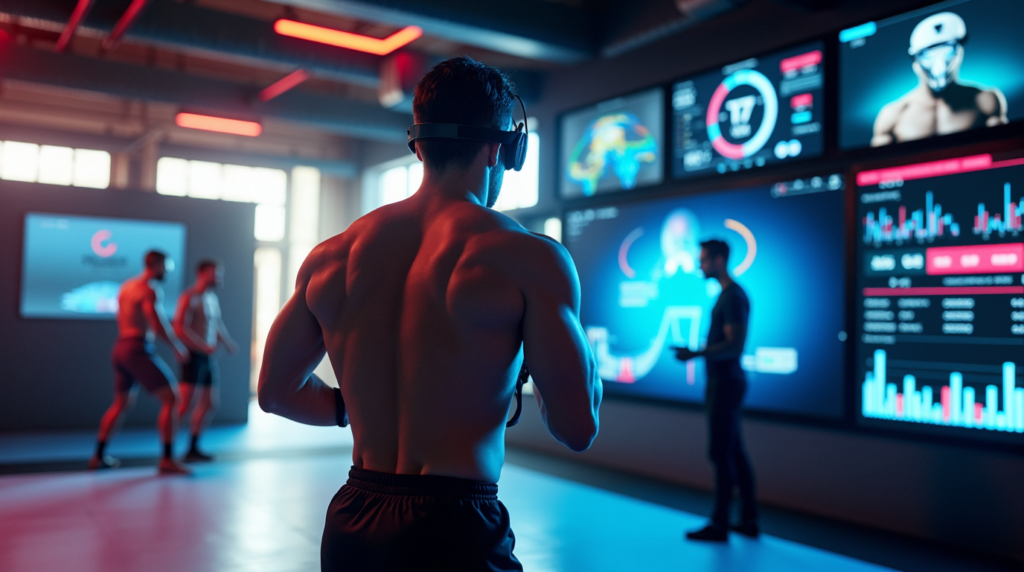
Innovation, Technology, and the Evolution of the Modern Fighter
The world of MMA is constantly evolving. As sports science advances and technology becomes more sophisticated, how will the modern fighter change?
We can expect to see a greater emphasis on data analysis to optimize training and strategy. Wearables and sensors will provide valuable information about physical performance, allowing coaches to personalize training programs and prevent injuries.
Virtual reality and artificial intelligence will also play an increasingly important role in combat simulation and the development of new techniques. Fighters will be able to practice in safe virtual environments, perfecting their skills and strategies without taking unnecessary risks.
In addition, nutrition and recovery will become areas of even greater focus. Fighters will follow personalized diets based on their genetics and metabolism, and use advanced technologies to accelerate recovery after training and fighting.
The future of MMA is exciting and full of possibilities. As science and technology continue to advance, we can expect to see even stronger, faster, and smarter fighters in the octagon.
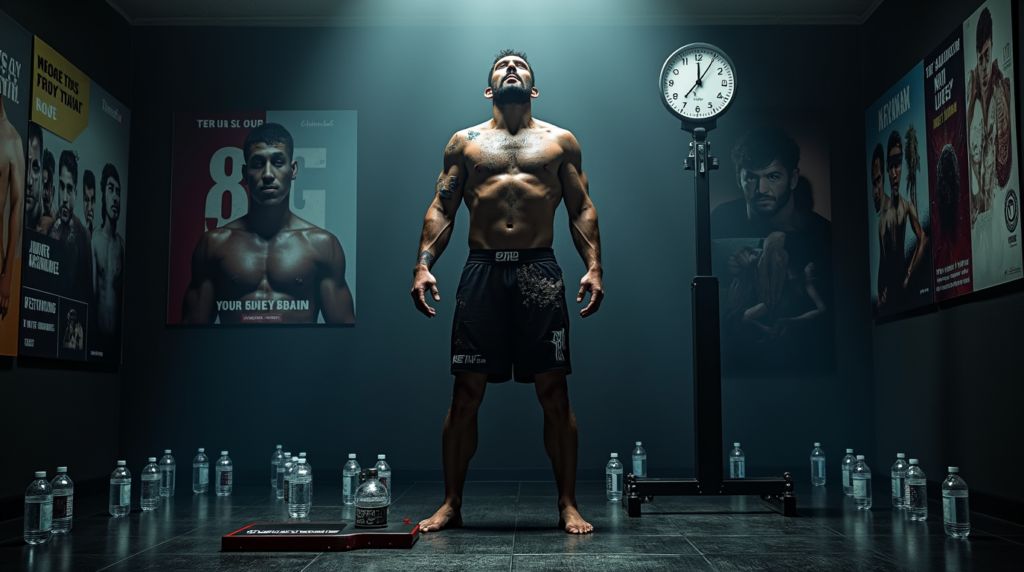
The Moral Dilemma of Weight Cutting in MMA
Weight cutting is an ingrained practice in MMA, where fighters drastically reduce their weight in the days leading up to a fight to compete in a lower category. While considered part of the strategy, are we ignoring the inherent dangers to the health and safety of athletes?
We have seen tragic cases of fighters who have suffered brain damage, kidney failure, and even death due to extreme weight cuts. The long-term health consequences are even more concerning, with studies suggesting an increased risk of cardiovascular disease and neurological problems.
Is it fair for fighters to be forced to undergo this strenuous process for a competitive advantage? Or should we implement radical changes to protect their well-being?
Some proposed solutions include:
Same-day weigh-ins: Eliminate weigh-ins 24 hours before the fight, forcing fighters to compete at their natural weight.
Wider weight classes: Reduce the number of weight classes, allowing for greater variation in fighter size and weight.
More severe sanctions: Impose fines and suspensions on fighters who significantly exceed the weight limit.
The debate about weight cutting is complex, and there are no easy solutions. But it is time for the MMA community to confront this issue head-on and find a way to protect fighters from the dangers of this practice.
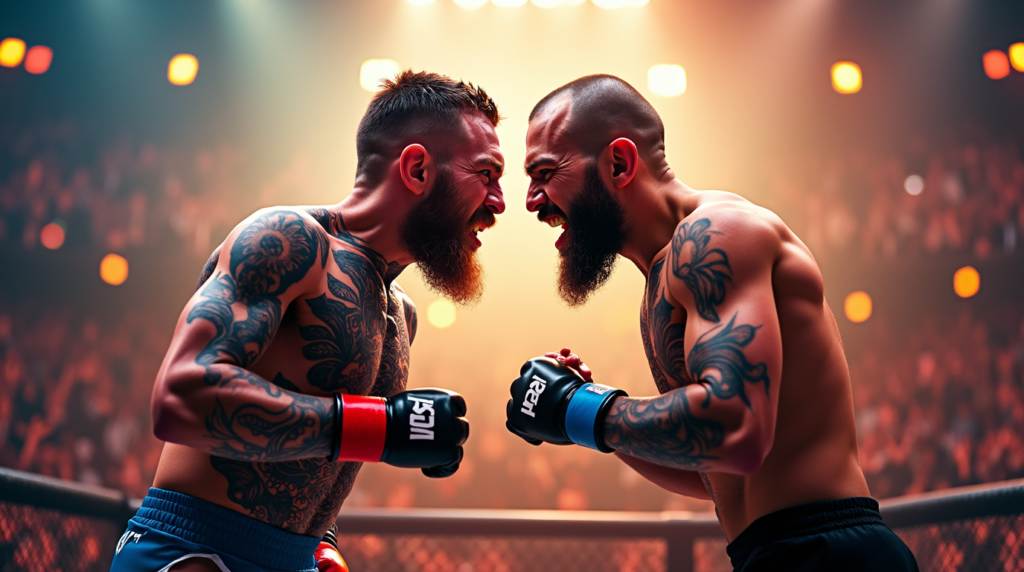
Is the McGregor-Nurmagomedov Rivalry the Greatest in MMA History?
The rivalry between Conor McGregor and Khabib Nurmagomedov transcended the sport. It was a clash of cultures, styles, and personalities that captured the attention of the entire world.
Beyond the infamous post-fight altercation at UFC 229, what made this rivalry so special? Was it McGregor’s arrogance and charisma against Nurmagomedov’s humility and discipline? Was it the clash of striking versus grappling styles? Or was it simply the intensity of the personal animosity between the two fighters?
Let’s analyze the factors that contributed to the magnitude of this rivalry:
The clash of personalities: McGregor, the Irish trash-talker, versus Nurmagomedov, the stoic Russian wrestler.
The clash of styles: McGregor, the explosive striker, versus Nurmagomedov, the dominant grappler.
The history: The McGregor bus attack and the post-fight altercation at UFC 229.
The stakes: The UFC lightweight title and the legacy of both fighters.
Does this rivalry surpass other great rivalries in MMA history, such as Liddell vs. Ortiz or Silva vs. Sonnen? Or was it simply a flash in the pan fueled by marketing and controversy? Leave your opinion in the comments.

The Legacy of Ronda Rousey
Ronda Rousey was an unstoppable force in women’s MMA, dominating the UFC bantamweight division for years. But her legacy is complex and controversial.
Some see her as a feminist icon who broke barriers and paved the way for women in a male-dominated sport. Others criticize her for her divisive personality and her carefully constructed image.
Was Rousey a true pioneer who inspired millions of women to pursue their dreams? Or was she simply a product of UFC marketing, used to attract a new audience to the sport?
Let’s analyze the different aspects of her legacy:
Her dominance in the octagon: Rousey was a dominant champion, winning most of her fights by submission in the first round.
Her impact on women’s MMA: Rousey brought women’s MMA to the mainstream, proving that women could be as exciting and profitable as men.
Her personality and controversies: Rousey was known for her self-confidence, but also for her controversial comments and her sometimes arrogant attitude.
Her later career: After suffering two consecutive defeats, Rousey retired from MMA and pursued professional wrestling and acting.
Is MMA the Natural Evolution of Human Combat?
Since the dawn of civilization, combat has been a constant in human history. From tribal struggles to modern wars, the need to defend and conquer has shaped our societies and our psyche. But what role does Mixed Martial Arts (MMA) play in this context? Is it simply a violent sport, or does it represent a natural evolution of human combat, a melting pot where the most effective strategies and skills are forged?
In an increasingly complex and sophisticated world, MMA offers a raw and honest look at the reality of physical confrontation. Unlike traditional martial arts, which often focus on specific techniques or spiritual philosophies, MMA embraces diversity and adaptability. An MMA fighter must be a master of multiple disciplines, combining the striking of boxing and muay thai, the grappling of Brazilian jiu-jitsu and wrestling, and the tactical cunning of chess.
But beyond technique, MMA also reveals deep aspects of human nature. Courage, endurance, discipline, and the ability to overcome fear are essential qualities for any successful fighter. In the octagon, there is no room for cowardice or indecision. Every decision, every movement, can make the difference between victory and defeat.
Some argue that MMA is a brutal spectacle that glorifies violence. However, others see in this sport an art form, an expression of the human capacity to overcome physical and mental limits. Like a dancer or a musician, an MMA fighter dedicates years of training and sacrifice to perfect their craft. Each strike, each submission, is the result of meticulous preparation and a deep understanding of the human body and the psychology of combat.
Furthermore, MMA can serve as a valuable tool for personal development and self-defense. Learning to defend oneself not only increases self-confidence but also provides a deeper understanding of the risks and responsibilities associated with violence. In a world where personal safety is a constant concern, the skills learned in MMA can be the difference between being a victim and being able to protect oneself and others.
However, it is important to recognize the inherent dangers in this sport. Injuries are common, and the risk of long-term brain damage is a real concern. It is essential that fighters receive adequate medical care and that safety measures are implemented to minimize risks.
Ultimately, MMA is a reflection of our own human nature. They are a reminder of our capacity for both violence and compassion, for brutality and beauty. Like any form of art or sport, MMA can be used for good or for evil. It is up to us, as a society, to ensure that this sport is practiced safely and ethically, and that it is used to promote the values of discipline, respect, and personal improvement.
Is MMA the natural evolution of human combat? The answer may be subjective, but one thing is clear: MMA is here to stay, and its impact on society and popular culture will continue to grow in the coming years.

The "Dana White" Effect: Business Genius or Benevolent Dictator in the World of MMA?
Dana White has been the face of the UFC for over two decades, transforming a niche promotion into a multi-billion dollar empire. His direct style, his passion for the sport, and his ability to connect with fans have made him an iconic figure. But behind the success lies a debate about his leadership and his influence in the world of MMA.
Is Dana White a business genius who revolutionized the sport and took it to new heights? Or is he a benevolent dictator who controls all aspects of the UFC, often at the expense of the fighters?
Let’s analyze the different aspects of his impact:
The Business Genius: White negotiated lucrative television deals, expanded the UFC globally, and created stars like Conor McGregor and Ronda Rousey. His vision and determination were crucial to the success of the promotion.
The Fighter Advocate (in his own way): White claims that he cares about the fighters and always looks out for their best interests. However, criticisms about low wages and the lack of benefits for athletes are constant.
The Controller: White has absolute control over the UFC, from the selection of fights to the promotion of events. His authoritarian style can be beneficial in some cases, but it can also stifle creativity and innovation.
The Controversial: White is not afraid to express his opinion, even if it means generating controversy. His comments are often direct, sometimes insulting, and can alienate some fans and fighters.
Is it possible to separate the business genius from the controversial controller? Or are both facets inseparable from his personality? Is it that his leadership style is necessary to maintain order in a world as chaotic as MMA?
Regardless of your opinion, it is undeniable that Dana White has left an indelible mark on MMA. His legacy will continue to be the subject of debate and analysis for many years.
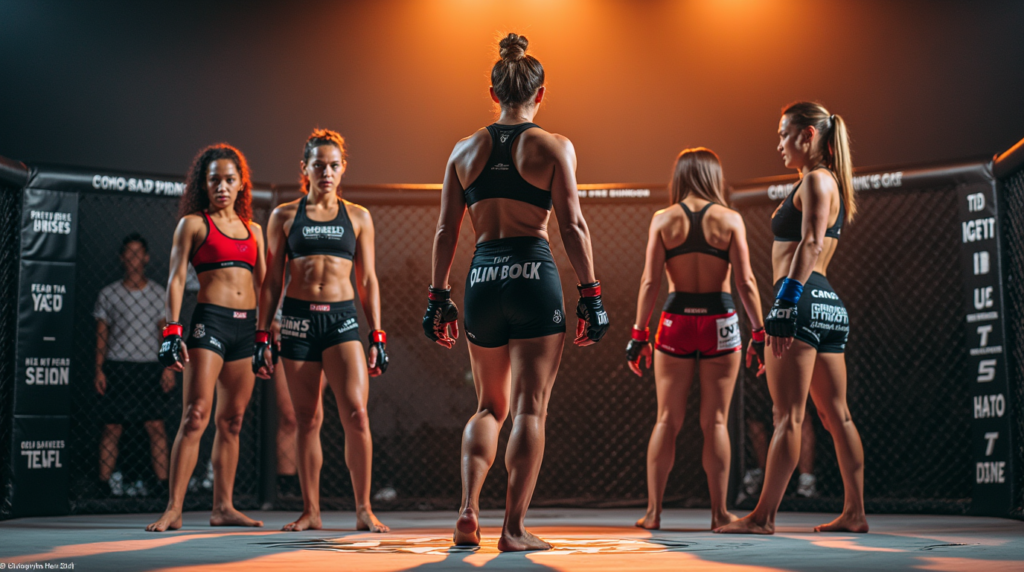
The Rise of Women's MMA: More than a Spectacle, a Sports Revolution?
Just a few years ago, women’s MMA was considered a curiosity, a sideshow in a sport dominated by men. Today, female fighters are some of the biggest stars in the sport, headlining pay-per-view cards and attracting a new audience.
But is the rise of women’s MMA simply a passing trend, driven by marketing and novelty? Or does it represent a true sports revolution, a fundamental change in the way we perceive gender and athleticism?
Let’s analyze the different aspects of this transformation:
The Talent: The quality of women’s fights has increased exponentially in recent years. Female fighters are showing technical skills, physical strength, and determination that rival those of men.
The Visibility: Thanks to figures like Ronda Rousey, Amanda Nunes, and Cris Cyborg, women’s MMA has gained unprecedented visibility in the media and popular culture.
The Social Impact: The success of female fighters is inspiring a new generation of girls and women to practice martial arts and challenge gender stereotypes.
The Challenges: Despite the advances, women’s MMA still faces challenges, such as the lack of equal pay and less media coverage compared to men’s fights.
Are we witnessing a true sports revolution, where women are finally receiving the recognition and respect they deserve in the world of MMA? Or is there still a long way to go to achieve gender equality in this sport?
Leave your opinion in the comments and share your thoughts on the future of women’s MMA.